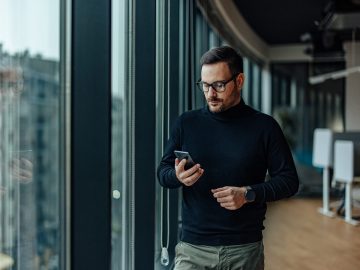Managing app permissions on your iPhone is essential to protecting your personal data and maintaining your digital privacy. Many apps request unnecessary access rights that could compromise your security. Learn how to change iPhone app permissions, which access rights are necessary, and which could be risky. We’ll also show you how Avira Mobile Security for iOS can help protect you from potential threats.
What are app permissions, and which ones are really necessary?
App permissions are specific access rights that an application on your iPhone needs to use certain functions or data. Some permissions are essential for an app to work, while others are optional or even concerning.
An overview of common app permissions and when they are actually needed
Necessary: Without these permissions, the app cannot perform its main function.
Optional or to be granted with caution: These permissions are not always required and may affect your privacy.
Allowing access to the camera
- Necessary for: Camera apps, social media apps (e.g. Instagram, Snapchat), video calls.
- Not necessary for: Apps that do not take photos or videos.
Allowing access to the microphone
- Necessary for: Voice messages, voice calls (e.g. WhatsApp, Skype), dictation features, social media apps, video calls.
- Not necessary for: Apps that do not record audio (e.g. a weather app).
Allowing access to location services
- Necessary for: Navigation apps (e.g. Google Maps, Apple Maps), weather apps.
- Not necessary for: Many games or apps that do not require location data. If an app requests location access without a clear reason, you should be cautious.
Allowing access to contacts
- Necessary for: Messaging apps (e.g. WhatsApp, Telegram) to find your friends.
- Not necessary for: A flashlight or notes app should not require access to your contacts.
Allowing access to the calendar
- Necessary for: Scheduling apps (e.g. Outlook, Google Calendar), booking apps (e.g. doctor’s appointments, hotel reservations).
- Not necessary for: Games or entertainment apps.
Allowing access to storage (photos, files)
- Necessary for: Photo and file apps (e.g. Google Drive, Dropbox, photo editors).
- Not necessary for: Games or apps that do not need to save or upload media.
How to check and change app permissions on the iPhone
Many people are unaware of the permissions their apps have. You can easily check and adjust them:
- Open the Settings app on your iPhone – this is the icon with the grey gear.
- Scroll down and tap on Privacy & Security. Here, you will see all permission categories.
- Select a category, such as Location Services, Microphone, or Camera.
- Tap on the app you want to review to see its permissions.
- Choose one of the following options:
- Never: The app has no access.
- While Using the App: The app can access the feature only when actively in use.
- Always: The app has continuous access (not recommended for most apps).
If an app isn’t working as expected, it may be missing necessary permissions. In that case, you can re-enable them and test the app again. If you use an Android device, it is also important to regularly review and adjust app permissions on Android.
Which app permissions should be critically examined?
Certain permissions can compromise your security and should be handled with caution or disabled.
Location services
Many apps request access to your location, even when it is not essential for their functionality. You can manage this by opening the Settings app, tapping on Privacy & Security, and selecting Location Services. Here, you’ll find a list of apps requesting location access. For each app, you can choose whether access is never allowed, only while using the app, or always enabled. It is recommended to limit access to While Using the App, unless absolutely necessary.
Tracking & location access
Apps may use your location data for advertising purposes. Since iOS 14.5, you can restrict this. Open the Settings app, go to Privacy & Security, and select Tracking. Here, you can decide whether individual apps are allowed to track your activity across different applications. For better privacy, disable tracking for all apps.
Microphone & camera
Some apps request access to your iPhone’s microphone or camera without a clear necessity. To check these permissions, open the Settings app, tap on Privacy & Security, and select Microphone or Camera. You’ll see a list of apps with access to these features. If an app requests microphone or camera access without a valid reason, disable its access.
How can I recognise dangerous app permissions?
There are several warning signs that an app may be requesting unnecessary or even dangerous permissions. The most common examples include:
Unusual requests
If an app, such as a flashlight, asks for access to your contacts or location, this is suspicious. The same applies to apps requesting camera or microphone access when they don’t actually use these features. Always ask yourself whether the requested permission is truly necessary for the app’s function.
Frequent crashes
Unstable apps may be poorly programmed or contain harmful elements that affect your device. If an app frequently freezes or closes unexpectedly, you should consider removing it.
Negative reviews
Poor ratings in app stores often indicate issues. Before installing an app, read user reviews. If there are frequent complaints about privacy concerns or excessive permission requests, be cautious.
Spyware and malware
Apps used as spyware or malware often request as many permissions as possible to collect your personal data. Always be critical and regularly check which apps have access to your iPhone’s features. If a permission seems suspicious, revoke it immediately in the settings or delete the app entirely.
Jailbreaking
Jailbreaking modifies the operating system to bypass Apple’s restrictions. However, this can make your device more vulnerable to malware. Additionally, apps with extended permissions may access your data without your knowledge.
Installing apps from trusted sources
An important step in protecting your privacy is to install apps only from trusted sources. The Apple App Store reviews applications for security risks and privacy violations before they are published.
Tips for safe app installation:
- Use only official app stores: These conduct regular security checks.
- Read reviews and ratings: If users frequently report privacy issues, proceed with caution.
- Check developer information: Reputable providers have an official website or clear contact details.
By carefully selecting apps, you reduce the risk of installing malicious or data-hungry applications. To free up space on your iPhone, regularly delete apps you no longer need.
How Avira Mobile Security for iOS helps you
Managing app permissions is important, but it can be time-consuming. Avira Mobile Security for iOS simplifies this process and protects you from unwanted access. The app detects and blocks suspicious applications that may pose a security risk. An integrated privacy scan shows you exactly which apps request unnecessary permissions, allowing you to restrict them as needed. Additionally, the VPN feature ensures an encrypted internet connection, keeping your data safe even on unsecured networks. With its user-friendly design, Avira Mobile Security is suitable for everyone and provides comprehensive protection for your device.
Avira Mobile Security for iOS makes it easy to protect your privacy and safeguard against digital threats. Install the app today and stay secure.













